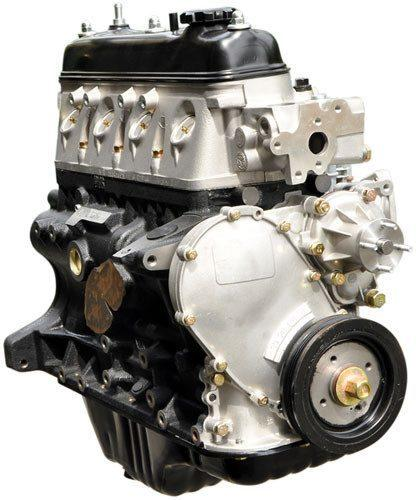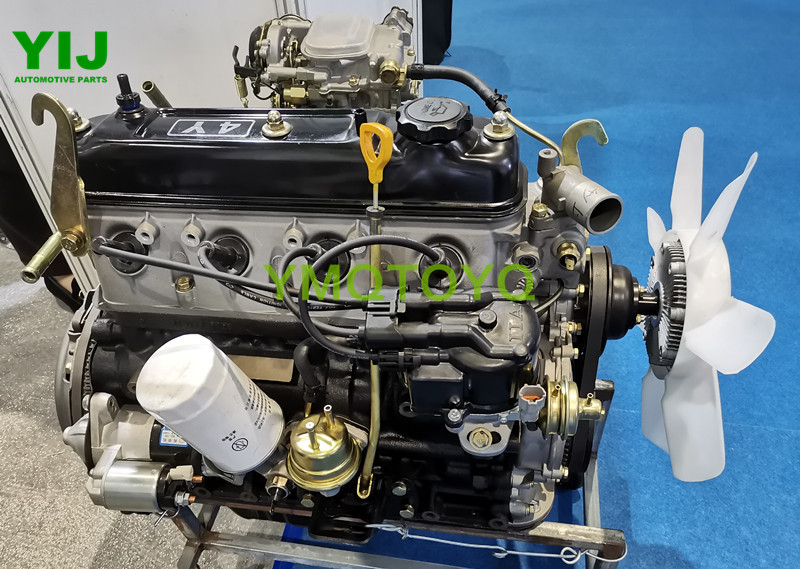How the 4Y Engine Powers Your Vehicle with Efficiency and Reliability
How the 4Y Engine Powers Your Vehicle with Efficiency and Reliability
Blog Article
Checking Out the Numerous Kinds Of Engine: Which One Fits Your Needs?
Internal combustion engines proceed to dominate due to their integrity, while electrical engines are gaining grip for their sustainability. Hybrid engines use a flexible concession, and diesel engines stand out for their power in requiring applications.

Inner Combustion Engines
Internal burning engines (ICEs) are the backbone of contemporary transportation, powering a vast range of lorries from vehicles to planes. These engines run on the concept of transforming fuel into power via a collection of controlled explosions within a burning chamber. One of the most usual sorts of ICEs consist of gasoline engines, diesel engines, and rotary engines, each created to fulfill details efficiency and performance demands.
Gas engines normally make use of stimulate ignition, while diesel engines count on compression ignition, causing unique distinctions in fuel performance and power outcome (4y engine). Rotating engines, or Wankel engines, offer a portable design and smooth procedure, but are much less commonly made use of in mainstream applications
ICEs have undergone significant developments in innovation, including the introduction of turbocharging and fuel shot systems, which enhance overall efficiency and performance. Despite their efficiency renovations, ICEs encounter boosting examination due to their ecological influence, specifically regarding greenhouse gas emissions.
Electric Engines
As issues regarding ecological sustainability and fossil gas reliance grow, electrical engines have become an engaging option to inner combustion engines. These engines use electrical motors powered by batteries or gas cells, supplying a cleaner and extra reliable motive powers.
Among the key benefits of electrical engines is their lowered exhausts. Unlike standard engines that melt nonrenewable fuel sources, electric engines generate no tailpipe discharges, considerably decreasing air contamination and adding to improved public wellness. Furthermore, the efficiency of electrical motors commonly goes beyond that of interior burning engines, converting a greater percentage of energy from the source of power into usable power for movement.
Electric engines are additionally significant for their quiet operation, making them perfect for urban atmospheres. 4y engine. The simplicity of their style results in less moving components, which can cause decreased upkeep costs and boosted reliability gradually
However, challenges continue to be, including battery manufacturing influences, charging framework, and range restrictions. Regardless of these hurdles, the growing financial investment in electric automobile modern technology and renewable resource sources factors toward a promising future for electrical engines, placed to play a vital function in the shift toward lasting transportation.
Crossbreed Engines
Blending the benefits of both standard and electric inner burning engines, hybrid engines represent a flexible option in the pursuit for efficient and sustainable transportation. These engines incorporate a gasoline or diesel engine with an electric motor, enabling boosted gas performance and reduced discharges compared to traditional lorries.
Crossbreed engines run in numerous modes, utilizing the electrical motor for low-speed driving and the inner burning engine for greater rates or when even more power is required. This vibrant procedure site not just enhances fuel economic climate however additionally adds to a smoother driving experience. Regenerative stopping is an additional crucial function, catching energy normally shed during braking and redirecting it to charge the battery.

As consumers increasingly focus on eco-friendliness, crossbreed engines stand apart as a practical selection, using an effective balance of efficiency, efficiency, and ecological obligation. This adaptability makes them ideal for metropolitan commuting and long-distance travel alike.
Diesel Engines
Effectiveness and power are trademarks of diesel motor, which have long been favored for their toughness and fuel economic climate. These engines operate the principle of compression ignition, see it here where air is pressed to a heat prior to fuel is injected, sparking it without the requirement for ignition system. This procedure allows diesel motor to accomplish greater thermal effectiveness contrasted to fuel engines, converting right into much better gas mileage and reduced carbon dioxide discharges.
Diesel engines are especially appropriate for sturdy applications such as vehicles, buses, and commercial machinery, where torque and toughness are paramount. Their style commonly includes stronger elements to stand up to the higher pressures generated during procedure, causing longer solution life and reduced maintenance costs.

Different Gas Engines
While diesel motor have long dominated the landscape of sturdy source of power, alternate fuel engines are gaining grip as viable alternatives for a more lasting future. These engines utilize a range of fuels, such as pressed gas (CNG), hydrogen, ethanol, and lp, intending to decrease greenhouse gas emissions and dependence on fossil gas.
One considerable benefit of alternate fuel engines is their possible to lower carbon footprints. CNG engines produce less pollutants contrasted to conventional diesel engines, making them ideal for metropolitan transportation systems and fleets seeking to enhance air top quality. Ethanol, originated from biomass, not just decreases exhausts but likewise supports agricultural economies.
Hydrogen gas cells represent a cutting-edge advancement in this world, providing zero-emission power with a chemical reaction between hydrogen and oxygen. Nonetheless, obstacles such as infrastructure advancement and manufacturing costs stay challenges to prevalent adoption - 4y engine.
Conclusion
To conclude, picking the proper engine kind requires careful factor to consider of particular needs and preferences. Interior burning engines provide reliability, while electrical engines prioritize sustainability and lowered upkeep. Hybrid engines incorporate the benefits of both, boosting efficiency, whereas diesel engines supply premium power and torque for durable applications. Different gas engines existing environmentally friendly choices, albeit with prospective facilities difficulties. Eventually, a detailed assessment of driving practices and environmental values will facilitate an informed decision regarding engine option.
Crossbreed engines use a flexible compromise, and diesel engines stand out for their power in requiring applications. The most typical kinds of ICEs include gas engines, diesel engines, and rotary engines, each designed to fulfill certain performance and efficiency demands.
Unlike standard engines that shed fossil fuels, electrical engines read the full info here create zero tailpipe exhausts, substantially reducing air contamination and adding to enhanced public health and wellness.Hybrid engines run in several settings, using the electric motor for low-speed driving and the interior combustion engine for greater speeds or when more power is required. Hybrid engines incorporate the benefits of both, enhancing performance, whereas diesel engines offer premium power and torque for sturdy applications.
Report this page